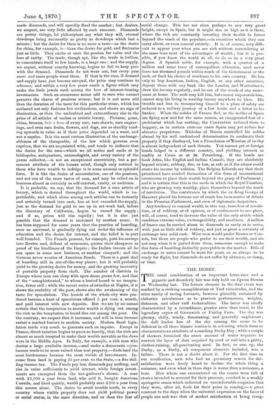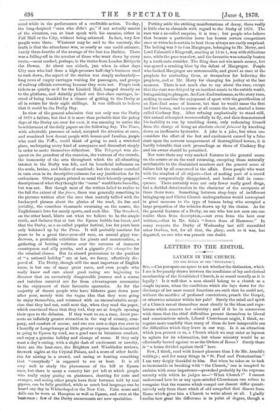THE DERBY.
TIIE usual combination of an important horse-race and a gigantic and disorderly fair was duly held on Epsom Downs on Wednesday last. The former element in the dual event was marked by a striking exemplification of Turf vicissitudes, and the utter vanity of racing forecasts, however plausibly sustained by elaborate calculations as to previous performances, weights, distances, and other turf technicalities. The latter was chiefly characterized by a resemblance, greater even than usual, to the legendary orgies of Greenwich or Fairlop Fairs. The day was gloomy, chilly, windy, threatening, and generally unpleasant ; the dull leaden hue of the sky causing the scene to be deficient in all those bizarre contrasts in colouring which form so characteristic an attribute of a sunshiny Derby Day ; while a couple of showers furnished the exact amount of water requisite to convert the layer of dust acquired by road or rail into a gritty, clothes-ruining, all-penetrating mud. In fact, to sum up, the Derby, as a Derby, all component elements included, was a failure. There is not a doubt about it. For the first time in our recollection, men who had no pecuniary reason for dis- satisfaction were freely heard to declare the whole thing a nuisance, and even what in these days is worse than a nuisance, a bore. Men whom one encountered on the course were full of stories intended to account for their presence, couched in a weakly apologetic strain which indicated an uncomfortable suspicion that they were, after all, fools for their pains in coming,— a great contrast to the days when the universal expression on the faces of people one met was that of modest satisfaction at being recog, sized while in the performance of a creditable action. To-day, the long-despised "man who didn't go," if not actually master of the situation, can at least speak with his enemies, either in Pall Mall or the City, without being ashamed. In fact, very few people were there. Whatever may be said to the contrary, the truth is that the attendance was, as nearly as one could estimate, barely three-fourths of the average of the last ten Derbies. There was a falling-off in the number of those who went down by every route,—most marked, perhaps, in the trains from London Bridge to the Downs. At about one o'clock, just when in other days City men who had done a high-pressure half-day's business used to rush down, the aspect of the station was simply melancholy— long rows of empty carriages waiting for passengers, and groups of railway officials sorrowing because they were not. People took tickets as quietly as if for the Limited Mail, lounged drearily on to the platform, and daintily picked out first-class carriages, in- stead of being thankful for a chance of getting to the Derby at all in return for their eight shillings. It was difficult to believe that it could be the Derby Day.
In view of the general admission that not only was the Derby of 1870 a failure, but that it is more than probable that the palmy days of the Derby are over for ever, it was amusing to notice the bewilderment of the daily papers on the following day. The Times, with admirable presence of mind, accepted the situation at once, and wondered how decent people with homes and families, people who read the Tiles, could think of going to such a wretched place, undergoing every kind of annoyance and discomfort simply in order to make themselves ridiculous. The Telegraph was elo- quent on the grandeur of the occasion, the vastness of the crowds, the immensity of the area throughout which the all-absorbing interest in the Derby was felt, and its beneficial influences on the souls, brains, and bodies of mankind ; but the reader searched in vain even in its descriptive columns for any justification for its enthusiasm. Other papers printed as usual their leisurely-prepared descriptions of what they thought the "scene" would have been like, but was not. But though most of the writers failed to realize to the full the extent of the fiasco, there was generally something in the pictures written after the race that scarcely tallied with the hackneyed phrases about the glories of the road, its fun and joviality, the countless thousands swarming on the course, the Englishman's love for manly sports, and such like. The Standard, on the other hand, blurts out what we believe to be the simple truth, and declares that at last the Epsom bubble has burst, and that the Derby, as a so-called popular festival, has for years been only bolstered up by the Press. It will probably continue for years to be a great three-year-old race, an annual gipsy ren- dezvous, a profitable exhibition for giants and monstrosities, a gathering of betting vultures over the carcases of innocent countrymen and silly youths, and a gigantic fête champetre for the criminal classes. But its absurd pretensions to the position of "a national holiday" are at last, we fancy, effectively dis- posed of. The Derby, though still the most important of English races, is but one of many great races, and even people who really know and care about good racing are beginning to discover that an excessively disagreeable journey and a coarse and tasteless carnival are far from advantageous accessories to the enjoyment of their favourite spectacles. As for the majority of decent people who have hitherto gone down year after year, merely with the vague idea that they were going to enjoy themselves, and returned with an uncomfortable suspi- cion that they had not, until next day, when they read the paper, which convinced them that they had, they are at length opening their eyes to the delusion. If they want to see a race, Ascot pre- sents an infinitely greater attraction in the way of scenery, com- pany, and comfort of access ; and one can now-a-days run over to Chantilly or Longchamps at little greater expense than is incurred in going to Epsom by road, see a good race in luxurious comfort, and enjoy a genuine holiday and change of scene. If they only want a day's outing, with a slight dash of excitement or novelty, there are the boat-race, the Brighton and Wimbledon reviews, firework nights at the Crystal Palace, and a score of other facili- ties for mixing in a crowd, and seeing or hearing something that " everybody " is supposed to see or hear. It is all very well to study the phenomena of the hill at Epsom once, but there is many a country fair yet left at which people who really enjoy gazing on giantesses, shooting for nuts and oranges, and seeing other people have their fortunes told by real gipsies, can be fully gratified, while as much bad language can be heard any day in Whitechapel or the New Cut. False noses and dolls can be worn at Hampton as well as Epsom, and even at the bettt-tace ; fewlof the Derby amusements are now specialties. Putting aside the striking manifestations of decay, there really is little else to chronicle with regard to the Derby of 1870. The race was a so-called surprise, it is true ; but people who believe that because a particular horse has beaten certain competitors once or twice he is certain to beat them always are easily surprised. The betting was 9 to 4 on Macgregor, belonging to Mr. Merry, and Lord Falmouth's Kingcraft, starting at 15 to 1, won with ridiculous ease, while the pace was slow, and the favourite was actually beaten by a tenth-rate outsider. The Ring does not win much money, but was spared a crushing blow by the defeat of Macgregor. People who backed Macgregor are unreasonable, and growl at once at the prophets for misleading them, at themselves for believing the prophets, and at Mr. Merry for changing his jockey at the last moment. There is not much else to say about the race, except that the start was delayed by an incident comic to the outside world, but agonizing to plungers. An East-End tradesman, so the story runs, seeking to combine the enjoyment of sport with the gratification of an East-End sense of humour, bet that he would name the first and last horses, and to secure at all events the last, started a horse called Cockney Boy. After refusing emphatically to stand still, this animal attempted unsuccessfully to fly, and then demonstrated his inability to run by tumbling down, only redeeming himself from the charge of being an absolute cheval faineant by knocking down an inoffensive bystander. A joke is a joke, but when one considers the effect of the fret and excitement caused by a false start upon the nervous temperament of thoroughbred horses, it is hardly tolerable that such proceedings as those of Cockney Boy and his owner should be permitted.
Nor were there any very marked features in the general scene on the course or on the road returning, excepting those naturally attributable to the diminished numbers and the general sense of failure felt by all concerned in the affair. Even people who went with the simplest of all objects—that of makiag part of a crowd —were comparatively disappointed, and looked dull in conse- quence. There certainly were not only fewer really good drags, but a decided deterioration in the character of the occupants of those there were. Something between shop-boys of indifferent bringing-up and Christ Church undergraduates would correspond in great measure to the type of human being who occupied a large proportion of the vehicles drawn up by the chains. As for the general features of a Derby, no one who has not seen one can realize them from description,—not even front the best ever written,—that in Mr. Sala's "Seven Sons of Mammon." In many respects the Derby of Wednesday last still resembled other Derbies, but, for all that, the glory, such as it was, has departed, no one who was present can doubt.































 Previous page
Previous page